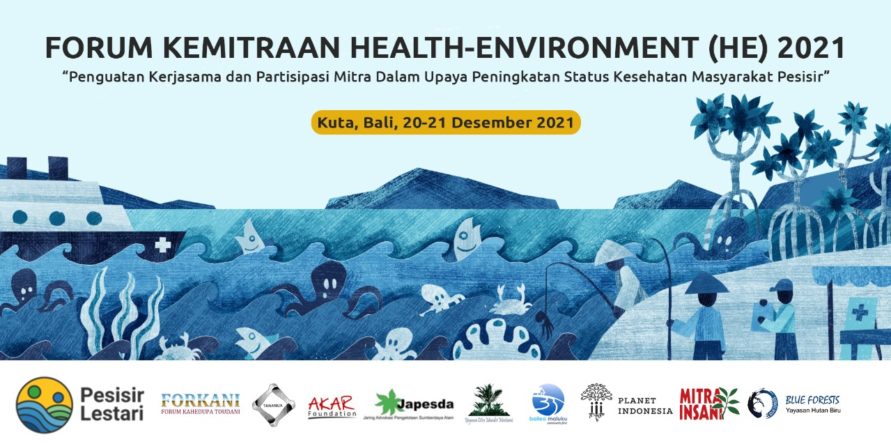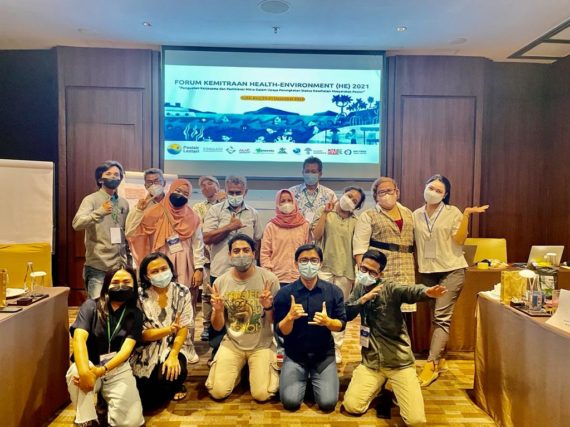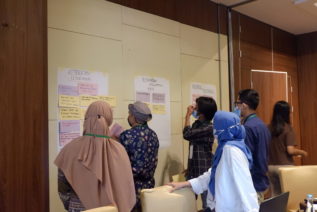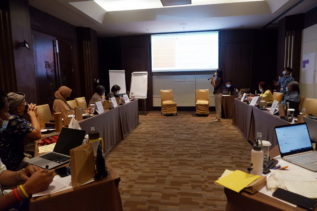Soon after joining Yayasan Pesisir Lestari (YPL) in 2021, I had the opportunity to meet our partners integrating health interventions into their conservation work at a forum. I was both excited and nervous to host such a forum with YPL colleagues and to have the chance to listen, learn and share with partners from different regions and backgrounds.
In December 2021, we hosted a lively learning and knowledge-sharing forum to encourage partners to collaborate and build a health-environment framework in Indonesia. We discussed how the health-environment approach for conservation has developed in Indonesia, with nine partners now using these methods to improve public health in coastal communities. I remember the excitement during the first participatory session where teams identified and prioritised challenges, and explored potential solutions tailored to different contexts. It was eye-opening for me to learn how partners work with local primary healthcare centres called puskesmas to address different health issues.
Four partners with experience in health-environment approaches led the learning exchange session and provided a platform to help other organisations learn from one other. A health-environment expert and lecturer from Udayana University also talked about how unmet water, sanitation and hygiene (WASH) needs contribute to community health problems, and how practical technological solutions can help address them.
Exchange forum interactions showed how technologies such as floating latrines and desalination plants could reduce waterborne diseases in rural communities. We then mapped out all health issues through a community participatory exercise to identify common health challenges, and prioritise those affecting larger groups.
We also engaged a Blue Communities researcher Nuzulia Mutika Sari, whose work focuses on the well-being of communities in Selayar in South Sulawesi in Indonesia, to see how we could integrate some solutions in our site areas. The main focus of the well-being research is to increase community engagement and participation and improve community-led conservation.
In this partner’s forum, the YPL team developed indicators of health-environment problems to explore potential solutions and outcomes. Partners held discussions then agreed on a suitable health-environment concept focusing on coastal communities, strengthening the existing public health care system, and covering priority healthcare issues such as nutrition, health ambassadors, water and sanitation.
The main commitment for all partners was to assign staff to collect data and work on health and the environment. They also documented the learning and knowledge exchange sessions, highlighted community needs, and defined an action plan for a health-environment network.
I was grateful and happy to see that the forum succeeded in providing an open space for partners to discuss and frame the health-environment approach in terms of Indonesia’s context and to hear participants’ feedback.
I think the forum went well. Some topics still require further and separate discussion, such as the use of technology for floating latrines, or other topics that require experts,” said Kristopel Paino, a fisheries program manager at JAPESDA.
The health-environment forum will strengthen collaborations between conservation organisations and communities, and improve the health status of coastal communities by providing opportunities for people from various backgrounds to come together and share ideas.
I think regular joint efforts are important in assisting coastal communities to improve their health and hope more organisations will join the forum and support the learning process,” said Gian Nofrianda Ilyas, who works in health environment for Yayasan Mitra Insani.
By Ni Putu Wiastari





